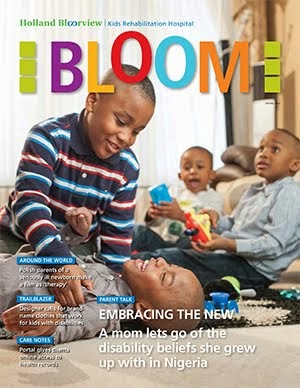A community garden and farmer’s market, arts programs, yoga and a café are part of a Toronto housing community Skye Gross (above left) envisions will bring adults with disabilities and artists together to live and work.
“This is a radical departure from anything we’ve seen before,” says Skye, whose daughter Rachael, 18, has complex medical and developmental needs. “The current housing, recreation and job opportunities for people like my daughter are minimal, expensive, isolating and stigmatizing. I don’t want that for her, so I decided to build something better.”
Skye joined with Jan MacKie (right) and Karin Farkashidy (centre) to create the non-profit Triluma Living Collaborative, which aims to develop this new model of housing. The three women have a long history as leaders in Holland Bloorview’s Spiral Garden and Centre for the Arts.
“We’re looking to create a holistic community that will be completely inclusive, not just of people with developmental challenges, but of artists, wellness practitioners, families and community organizers,” Skye says.
The project will incorporate housing as well as commercial ventures that draw the public in.
Triluma is a response to the current housing crisis for adults with developmental disabilities in Ontario.
Earlier this year, a report from the Select Committee on Developmental Services said there were 12,000 Ontario adults on a list for group homes with a wait of 20 years. The report also noted that 2,300 families of adults are waiting for respite in a province with only 225 available respite beds.
Since then, the Ontario Ministry of Community and Social Services has partnered with MaRS—the medical research and social innovation hub in Toronto—to develop and test new housing models.
In April, MaRS issued a Challenge Brief with this question: “What would homes and communities need to look like for citizens with developmental disabilities to achieve citizenship: to live in the communities they choose, to grow and lead full lives?”
Skye hopes Triluma will be chosen as a MaRS incubator project to receive pilot money.
“No matter how lovely I make our beautiful, accessible home, eventually I’m not going to be here anymore and I don’t want my daughter being thrust into a strange environment with people she doesn’t know,” Skye says. “People want affordability, an end to isolation, and this notion of meaningful livelihood—as opposed to killing time watching TV. Our model addresses those elements.”
Skye hopes that a Triluma community will be operational in five years. “To start with we’ll need government support, but we won’t rely on ongoing government funding. Our financial model will allow residents to pay a reasonable rent in exchange for contributing their time to building and sustaining the community.”
That could mean growing food in the garden and selling it at a weekly market, or working in the café or in an arts program.
To launch their inclusive community building model, Triluma is offering Welcoming Back the Light workshops on Sunday Dec. 7 and 14 from 2-4:30 p.m. at Evergreen Brick Works.
Bring your kids and learn how to build lanterns and work with light and shadows in preparation for a Winter Solstice celebration on Dec. 21 at 5:30 p.m. All are welcome!

























1 comments:
Beautiful concept. I'd be interested in knowing about what level of caregiving requirements they envision
including.
Post a Comment